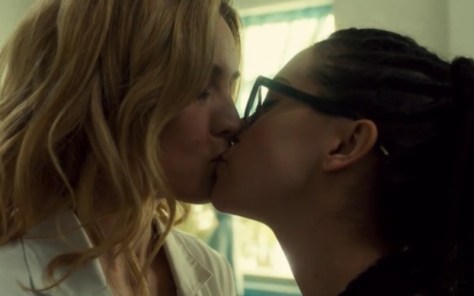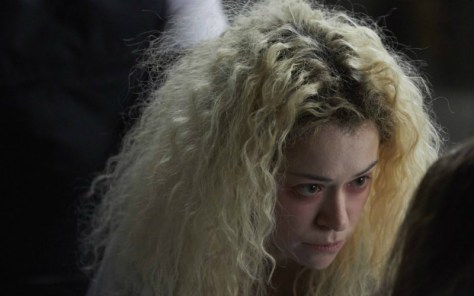Spoiler warning: Do not read this article until you have seen Orphan Black Episode 510, “To Right the Wrongs of Many.â€
“I survived you. We survived you, me and my sisters, together.” —Sarah
In the end, Orphan Black‘s Big Bad, dying eugenicist P.T. Westmorland (Stephen McHattie), was dispatched less than halfway through the series finale, his self-important, patriarchal sputterings cut short when Sarah (Tatiana Maslany) smashed an oxygen tank into his skull. Then the show turned its attention to what really mattered: the enduring sisterhood of Sarah, Alison, Cosima and Helena.
After five seasons of trauma and loss, the clones were given a relatively happy ending. A six-month flash forward showed that Helena was raising her twin boys with Alison and Donnie (Kristian Bruun), Cosima and Delphine (Évelyne Brochu) were traveling the world to cure hundreds of Leda clones (with a list given to them by Rachel), and Sarah was struggling to raise Kira (Skyler Wexler) without Mrs. S (Maria Doyle Kennedy)—but finding strength and comfort in the support of her diverse group of sisters.
According to Orphan Black co-creator Graeme Manson, it was the ending he had envisioned when he originally pitched the series to BBC America several years ago. “I think myself—and all of us—wanted a happy ending,” he says. “We wanted enough time to take a breath, come back and see what freedom meant to these sestras we’ve come to know so well.”
That the sisters defeated Neolution by banding together and embracing their differences also means a lot to Manson. “You know, a show about clones that at its core is about diversity, there’s something ironic and beautiful in that premise,” he says, “and to pull it off is kind of still a little bit flabbergasting.”
Manson joined us by phone to tell us more about the series finale, the show’s influence on Canadian television and what he plans to do next.
Well, I would argue that they were, in fact, not major story changes really. Like the resetting of what we planned to do, closer to home, I mean the biggest thing [that moving the action from the Island to Dyad] did with the story is allow us to have the supportive characters play a bigger role. But it wouldn’t have made any difference. We would have come back and spent the final two acts at home anyway, we would have cut ahead six months after Sarah’s climax had occurred on the Island. So the change wasn’t actually that massive. What was difficult about the change was that it late in the game, and it was hard on production.
So that six-month jump forward was the ending you’d always envisioned?
I had a shape for the finale that jumped six months later, after the climax of it, after we dispatched the Big Bad, and I think myself—and all of us—wanted a happy ending. We wanted enough time to take a breath, come back and see what freedom meant to these sestras we’ve come to know so well. And I think it was pretty early on in the season that we envisioned that Sarah was the stuck one. The brave woman who we’ve followed since she got off a train on the way home to steal her daughter and has gone through so much and has grown up and gained maturity and stepped into her late mother’s own shoes, that she would be the one who would still need to be carried over the line by her sisters. I think that was pretty solid pretty early. Quite honestly, we had large parts of the finale in mind since the end of last season.
I really appreciated that Sarah didn’t get a pat ending, that she still had some of the restlessness and rebelliousness in her that she’s had since the beginning.Â
Yeah, she was in danger of being right where she was when we met her. She was in danger of taking Kira away again. She was in danger of running away. But over the course of this thing, Sarah has learned responsibility.
Meanwhile, Cosima, Alison and Helena seem to finish the series with a sense of peace and purpose. Beyond the flash forward you showed us in the finale, have you given any thought to how the clones will spend the rest of their lives?
That’s entirely up to the fans. It really is. You know, I have ideas on where we could pick up another story, but I set them free, too. I don’t sit around wondering what they’re doing today. [Laughs.]
Since you mentioned it, are there more Orphan Black stories to tell in the future? Could we see another series or a film?
Yeah. I think that there’s a chance. I think we all need a break from it, and I think the characters need a break. But we’ve talked about a feature. I’d love to think of that someday.
I was thrilled that Cosima and Delphine got a happy ending, which—as you know—is pretty rare for a lesbian couple on TV. Did you always envision them making it to the end, or were you at all influenced by the backlash the show received when Delphine was almost killed off?
No. The truth is that I think I really understood the ‘Kill Your Gays’ trope, perhaps more than a few people as we were driving toward the dramatic end of [Season 3], and I absolutely refused to have that character die. I was OK with a cliffhanger that we could claw our way back from, but I was 100 per cent against ever killing [Delphine]. I knew we were going to take heat even cliffhanging it, but as long as we could bring her back, I was willing to take the heat.

But bringing her back was very difficult. I mean it was pretty obvious what was going on when you realize that Évelyne Brochu was the lead in another series. I mean, I don’t know what all the hoopla was about. [Laughs.] I mean, come, look, she’s got another series, what do you think happened here? And the fact that she was carrying another series made it extremely difficult, but I was 100 per cent determined to bring her back, even though I knew that we would get her back very, very lightly in the next season. I made the case hard to our people, to the producers to keep the thread alive, and I made the pitch hard to Évelyne and said, ‘This is not the end. We want to bring you back. It’s the right thing for the show. It’s the right thing for these characters. You started the show, you’ve gotta end the show.’ And Évelyne really took it to heart, and we made it work.
What was the final scene that you filmed before wrapping the series?
The final moment was a piece of the birth with Sarah already wrapped. It was Tatiana as Helena and Art [Kevin Hanchard]. That final clone scene and that amazing birth were our final two days.
Was it very emotional for everyone?
It was four o’clock in the morning, and starting at about one o’clock in the morning, the cast started arriving—people that had long wrapped, crew who had been wrapped, people from past seasons, producers, network people. The number of people behind the monitors grew and grew until there were about 70 people behind the monitors waiting for that final cut. And it was super emotional. Everybody just stood in silence for a little while, and then people began to speak, there were testimonies. Maria Doyle Kennedy sang a song. And then we ate bagels with cream cheese and had champagne.
Orphan Black is credited with ushering in a Golden Age of Canadian television. What does that mean to you?
First of all, we’re thankful for coming up in the Canadian system and getting a show over the wall and being given the reins by our network and by our producers. And anything that we did to inspire others, whether that be business models or to inspire more confidence in the business or inspire more confidence in creativity, giving creatives full reign, that’s just great. We came up in Canada, you know? I’ve spent my whole career here. If it is true that the show has done that, then I’m very proud of that. You know, I’m certainly happy to see so many writers and actors that have come through the show going on to other stuff, and to keep the bloodline going I think is important to all of us.
What about Orphan Black makes you the proudest?
Oh, wow. I think it has something to do with wrestling this main character, Sarah, through this long journey and spending so much time with a character that formed the backbone of the show. And then working with so many incredibly talented women like Tatiana, like [science consultant] Cosima Herter. To have created a show that really did manage to break some molds as far as putting women at the centre and a show that managed to have a message underneath really fun storytelling and the action, edge-of-your-seat shit.
But that’s not as important as a show that’s main thrust, main message—especially in this political climate—is that there is strength in diversity. That’s a biological truth, and at its core, that’s what this show is about. You know, a show about clones that at its core is about diversity, there’s something ironic and beautiful in that premise, and to pull it off is kind of still a little bit flabbergasting.
What’s next for you?
I can only tease, but suffice to say that I’m continuing to explore some of the themes of Orphan Black in terms of science, citizen science, the limitations of science. I’m continuing to explore these themes with the real Cosima, Cosima Herter, with [series co-producer] Mackenzie Donaldson and with some other members of the Orphan Black family.
And so many people who have come up from Orphan Black are now onto their next things. Some of them are original. Some people have gone higher and further. I continue to be inspired by the themes and ethics and political stance of Orphan Black and continue to be super proud of everybody else and their own next steps, too.
Is there anything else you’d like to say now that the show’s final trip has ended?
Just a huge thank you from me and all of us at Orphan Black to Clone Club and all the supporters of the show.
Images courtesy of Bell Media.










